|
Save the Cord Foundation recently spent time interviewing 4-time cancer survivor Theresa Camilleri as part of our on-going series "#WeCanICan: Beat Cancer with Cord Blood" in association with World Cancer Day. Written by Stephani Jacob
What is Myelodysplastic syndromes (MDS)?
Myelodysplastic syndromes (MDS) are a family of rare disorders in which the bone marrow fails to make enough healthy red blood cells, white blood cells or platelets. This is caused because your bone marrow is producing lots of underdeveloped, or immature, cells that have an abnormal shape, size or look. These are called blast cells. Most experts agree that MDS is a form of blood and bone marrow cancer.
One year later, Theresa’s lymphoma created tumors so large that they blocked her gall bladder and liver. She turned jaundice, and needed to have a stent put into her liver to help bypass the blockage. Theresa was put on high doses of prednisone, and began rituximab. Although this treatment regimen was being used to help Theresa’s new issues, it simultaneously created a new dilemma. When a person receives chemotherapy, their white blood cell count drops. Since Theresa’s counts were already low due to her MDS, this made it very problematic for Theresa’s doctor to treat her. She wound up in the hospital with a fever of 106.1, and was put into isolation because she had no white blood cell count. After about a week, Theresa was released from the hospital. Several months later, once the doctor was able to get her lymphoma under control, Theresa was told that she would need a bone marrow transplant. The doctor could not promise that he would be able to save her again. Next, Theresa was introduced to a doctor in the bone marrow transplant unit. Unfortunately, a bone marrow transplant match could not be found from her family or in the bone marrow registry. Little did Theresa know, her luck was about to change. Some magical news was about to arrive while on her annual Disney World trip with her family. “I can remember exactly where I was when I received the news we had been waiting for,” Theresa recalls, “I received a call from my nurse while I was sitting in my wheelchair in the Magic Kingdom!” Theresa was told that there were two cord blood donors, which would both be provided for her. Eventually, the stronger and more dominant cord transplant would take over in her body. Theresa remembers her mom saying, “it is pure, it was a true gift from God.” 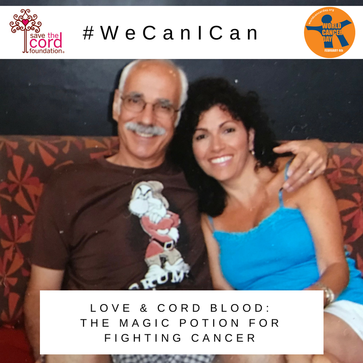 Theresa with her husband during that special Disney World Trip Theresa with her husband during that special Disney World Trip Leading up to the cord blood transplant, Theresa had to go through numerous chemotherapy sessions and full body radiation to wipe out her entire immune system. The purpose of this was so her body could prepare to receive a new and healthy immune system. Because it was a cord blood transplant, it took longer for the new stem cells to work. Therefore, Theresa had to be away from her family, and in total isolation for two months. She had a port and a catheter to allow her body to get the fluids, medications, and the nutrition needed. There were months of blood and platelet transfusions, close monitoring of Theresa’s immune system, learning how to eat again, and getting her whole digestive system back to being healthy. Theresa recollects, “Having a cord blood transplant was the most difficult thing I have done on this journey,” adding, “I was weak, I was in pain, but I had hope in my heart and faith flowing along with the new blood system in my body. I had a whole new immune system, and a new blood type, but I was still Theresa and grateful to be alive.” Theresa credits her family for being an integral part of her journey back to health. During those two months in the hospital, Theresa’s husband, after working a full day, would commute from Long Island to Manhattan every night to be by her side. Once released from the hospital, Theresa was unable to resume her normal lifestyle until her body healed and her immune system grew stronger. In addition to her family taking her to doctor’s appointments, there were many everyday chores and errands that the family had to take charge of. Theresa reflects on the countless days her mom stayed with her, at one point grabbing her hand and saying, “don’t worry, I am here.” Theresa remembers her son transferring to a local college to be closer to home so that he could help out. He was his sister’s transportation, went grocery shopping, and was just there to make Theresa happy. There was also Theresa’s “little nurse”, her daughter, who made sure she took all her medicine, while ensuring Theresa was as comfortable as possible. The blood and platelet transfusions were given by Theresa’s family, friends, and also from her brother's peers in the NYPD and Fire Department. She lovingly recalls, “My children, my husband, my mom, my sister, and my brother were all my immediate strength. I am a woman blessed with an amazing family.” There was no doubt that Theresa was not alone in her painstaking battle back to health. After a grueling journey, Theresa advises those currently diagnosed with cancer to be their own advocate, finding doctors in whom they have faith. Theresa’s doctors continue to be vigilant, watching her case carefully. During a routine CAT scan recently to monitor Theresa’s lymphoma remission, a doctor noticed fluid around her ovaries. Eventually, this led to an early diagnosis of ovarian cancer. After a full hysterectomy was performed, biopsies revealed that there was no more cancer. Incredibly, Theresa was now a four-time cancer survivor. She states, “I am so blessed to have such amazing doctors that I feel are always one step ahead.” In addition to Theresa’s dedicated medical care team, the cord transplant not only cured Theresa’s MDS, but has also kept her lymphoma in remission. Theresa suggests taking the cancer journey one day at a time. “When the chemo began, I would say to myself, “Okay, one done. I almost gave myself a hug and a chance to breathe by doing that… otherwise, if I looked at the whole journey as one big thing, it became overwhelming and I could not focus on today.” Theresa is very passionate about helping others understand all that is out there for people suffering with a cancer diagnosis. She states, “I might have gone through a lot to get to the place where I am today, but I am here, I am alive and well. And, it is all because of this precious gift of life from a beautiful baby and its loving parents.” Theresa asks for any parents that remain skeptical about whether a cord blood transplant is necessary to listen to her story. It is now twelve years since her original diagnosis, and she is so grateful to every person that has helped her along the way. Theresa does not take a day for granted. “When we were little, my daddy taught us to "take time to smell the roses." This hasn't been easy but I do what I have done from the beginning, I take it one day at a time. If today isn't good, tomorrow will be better. I have love, I have my faith and I have hope.”
Comments are closed.
|
AuthorWrite something about yourself. No need to be fancy, just an overview. Archives
January 2024
Categories |

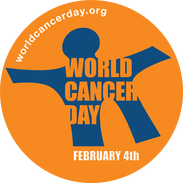
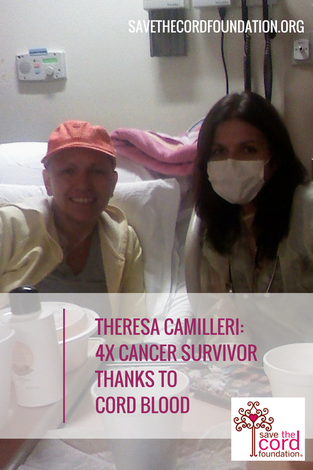
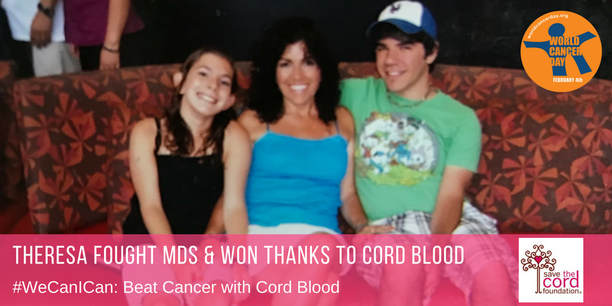
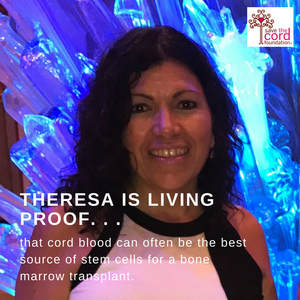
 RSS Feed
RSS Feed


